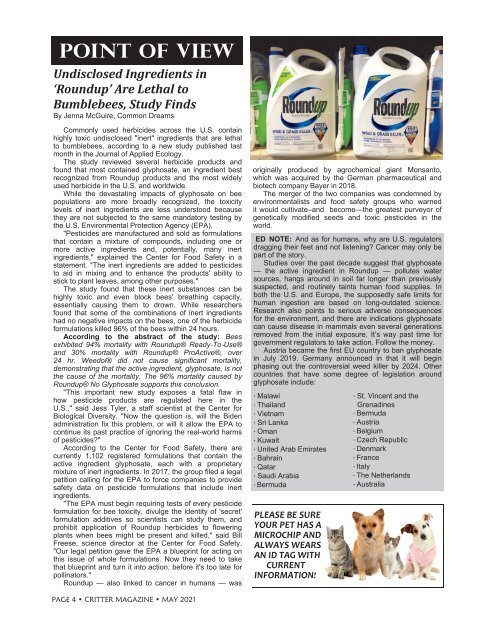Create successful ePaper yourself
Turn your PDF publications into a flip-book with our unique Google optimized e-Paper software.
Point of View<br />
Undisclosed Ingredients in<br />
‘Roundup’ Are Lethal to<br />
Bumblebees, Study Finds<br />
By Jenna McGuire, Common Dreams<br />
Commonly used herbicides across the U.S. contain<br />
highly toxic undisclosed "inert" ingredients that are lethal<br />
to bumblebees, according to a new study published last<br />
month in the Journal of Applied Ecology.<br />
The study reviewed several herbicide products and<br />
found that most contained glyphosate, an ingredient best<br />
recognized from Roundup products and the most widely<br />
used herbicide in the U.S. and worldwide.<br />
While the devastating impacts of glyphosate on bee<br />
populations are more broadly recognized, the toxicity<br />
levels of inert ingredients are less understood because<br />
they are not subjected to the same mandatory testing by<br />
the U.S. Environmental Protection Agency (EPA).<br />
"Pesticides are manufactured and sold as formulations<br />
that contain a mixture of compounds, including one or<br />
more active ingredients and, potentially, many inert<br />
ingredients," explained the Center for Food Safety in a<br />
statement. "The inert ingredients are added to pesticides<br />
to aid in mixing and to enhance the products' ability to<br />
stick to plant leaves, among other purposes."<br />
The study found that these inert substances can be<br />
highly toxic and even block bees' breathing capacity,<br />
essentially causing them to drown. While researchers<br />
found that some of the combinations of inert ingredients<br />
had no negative impacts on the bees, one of the herbicide<br />
formulations killed 96% of the bees within 24 hours.<br />
According to the abstract of the study: Bees<br />
exhibited 94% mortality with Roundup® Ready‐To‐Use®<br />
and 30% mortality with Roundup® ProActive®, over<br />
24 hr. Weedol® did not cause significant mortality,<br />
demonstrating that the active ingredient, glyphosate, is not<br />
the cause of the mortality. The 96% mortality caused by<br />
Roundup® No Glyphosate supports this conclusion.<br />
"This important new study exposes a fatal flaw in<br />
how pesticide products are regulated here in the<br />
U.S.," said Jess Tyler, a staff scientist at the Center for<br />
Biological Diversity. "Now the question is, will the Biden<br />
administration fix this problem, or will it allow the EPA to<br />
continue its past practice of ignoring the real-world harms<br />
of pesticides?"<br />
According to the Center for Food Safety, there are<br />
currently 1,102 registered formulations that contain the<br />
active ingredient glyphosate, each with a proprietary<br />
mixture of inert ingredients. In 2017, the group filed a legal<br />
petition calling for the EPA to force companies to provide<br />
safety data on pesticide formulations that include inert<br />
ingredients.<br />
"The EPA must begin requiring tests of every pesticide<br />
formulation for bee toxicity, divulge the identity of 'secret'<br />
formulation additives so scientists can study them, and<br />
prohibit application of Roundup herbicides to flowering<br />
plants when bees might be present and killed," said Bill<br />
Freese, science director at the Center for Food Safety.<br />
"Our legal petition gave the EPA a blueprint for acting on<br />
this issue of whole formulations. Now they need to take<br />
that blueprint and turn it into action, before it's too late for<br />
pollinators."<br />
Roundup — also linked to cancer in humans — was<br />
originally produced by agrochemical giant Monsanto,<br />
which was acquired by the German pharmaceutical and<br />
biotech company Bayer in 2018.<br />
The merger of the two companies was condemned by<br />
environmentalists and food safety groups who warned<br />
it would cultivate–and become—the greatest purveyor of<br />
genetically modified seeds and toxic pesticides in the<br />
world.<br />
ED NOTE: And as for humans, why are U.S. regulators<br />
dragging their feet and not listening? Cancer may only be<br />
part of the story.<br />
Studies over the past decade suggest that glyphosate<br />
— the active ingredient in Roundup — pollutes water<br />
sources, hangs around in soil far longer than previously<br />
suspected, and routinely taints human food supplies. In<br />
both the U.S. and Europe, the supposedly safe limits for<br />
human ingestion are based on long-outdated science.<br />
Research also points to serious adverse consequences<br />
for the environment, and there are indications glyphosate<br />
can cause disease in mammals even several generations<br />
removed from the initial exposure. It’s way past time for<br />
government regulators to take action. Follow the money.<br />
Austria became the first EU country to ban glyphosate<br />
in July 2019. Germany announced in that it will begin<br />
phasing out the controversial weed killer by 2024. Other<br />
countries that have some degree of legislation around<br />
glyphosate include:<br />
· Malawi<br />
· Thailand<br />
· Vietnam<br />
· Sri Lanka<br />
· Oman<br />
· Kuwait<br />
· United Arab Emirates<br />
· Bahrain<br />
· Qatar<br />
· Saudi Arabia<br />
· Bermuda<br />
PLEASE BE SURE<br />
YOUR PET HAS A<br />
MICROCHIP AND<br />
ALWAYS WEARS<br />
AN ID TAG WITH<br />
CURRENT<br />
INFORMATION!<br />
· St. Vincent and the<br />
Grenadines<br />
· Bermuda<br />
· Austria<br />
· Belgium<br />
· Czech Republic<br />
· Denmark<br />
· France<br />
· Italy<br />
· The Netherlands<br />
· Australia<br />
PAGE 4 • CRITTER MAGAZINE • MAY 2021
















